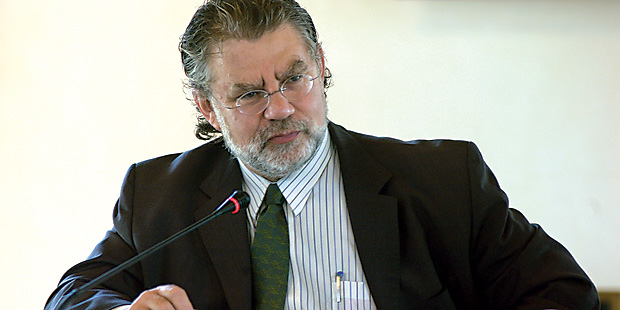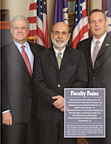Forging Ahead
Joseph Weiler looks back at the five years he spent as director of the global program and chair of the graduate division, and turns toward the future.
Printer Friendly VersionWhen you accepted leadership of the Hauser Global Law School Program, you described an ambitious and broad agenda. How would you rate your success in carrying through on your ideas and plans? Nemo iudex in causa sua! You don’t really expect me to answer that question?
Okay, then, which of your initiatives mattered to you most? And next you will ask which of my five children do I like most? Let me try to list my five favorites.
The Global Fellows Program was one of the fundamental building blocks of “The Turn to Scholarship”—the principal motto of my tenure as director. It sets the gold standard for such programs. The soaring number and quality of the applications we receive, the success of the Global Working Paper Series and the strong and abiding ties created with our fellows tell the story.
I am very attached to the new doctoral program. We provide full funding, which I believe is unique among U.S. law schools. We have become extremely selective, picking but a handful of the most promising candidates and then following them assiduously as skeletal research plans become fully fledged dissertations.
NYU’s graduate program, composed mostly of overseas students, is larger than most of our peer schools’. Foreign students are not token visitors but a critical mass, which redefines our classrooms, affects our institutional culture and reconstitutes our intellectual community. We truly are a global law school. The new Graduate Division is an expression of this commitment and awash with new initiatives. Examples? The Lawyering Program for LL.M.s— another first.
Singapore: Enter a classroom on the world-class campus of the National University of Singapore. Shut your eyes. You could be in Vanderbilt Hall: Students from the United States, Europe, Latin America, Australia and Asia; teachers—Philip Alston, Stephen Gillers, etc.—are familiar. While some classes are the same as those taught in New York City, others are quite different. Taught by the National University of Singapore Faculty of Law, the leading law school in Asia, students will be absorbing knowledge they could not obtain anywhere but Asia itself. The combination has no parallel. The effort of all concerned is enormous. So are the rewards. Students will emerge after a strenuous year with an NYU LL.M. and an NUS LL.M.—testament to a new frontier of global legal education at its most imaginative.
Last, least, but most fun: I have installed a webcam in my office window overlooking the courtyard of Vanderbilt Hall. Beautiful and vibrant in all seasons, the courtyard is a spatial expression of the excitement of NYU Law. I love looking up from my desk and watching life pass by; occasionally an overseas student will be talking on a cell phone to a loved one far away.
In announcing your decision to step down as director, Dean Richard Revesz mentioned three books you were hoping now to complete. Is it really true that you are writing a Jewish cookbook? Have you heard the joke about the definition of kosher? If it’s good, it can’t be kosher!
There is no shortage of Jewish cookbooks, but to read most of them you would get the impression that Jews eat only on the Sabbath and the various festivals—Okay, on Sunday they eat the leftovers and the rest of the week they order takeout, usually Chinese. And that Jews eat only meat—and if they will make a concession to vegetables, potatoes will do nicely, thank you.
My cookbook, Kosher, but Really Good…! is an exercise in the unexpected. Take the chapter entitled “Land of Milk and Honey?” My wife and I give various wonderful combinations of cheeses and honeys. One of my hobbies for years has been beekeeping (yes, in our New York City backyard). And in our pantry we have a huge (global!) collection of honeys, from the bittersweet Sardinian Corbezzolo to the perfumed Tasmanian leatherwood. Once you have combined cheese and honey, you risk never wanting either of them on their own.
Your books speak to an impressive range of interests. Tell us about the one on the Bible. The Genesis of Our Civilization—Five Essays on the Book of Genesis is another exercise in the unexpected. Consider an essay on Eve and Adam, in which I argue that Eve, in that very act of transgression, paradoxically completes our creation in the image of God as sovereign moral agents with the capacity to say No, and hence establishes the only position from which one can also truly say Yes. Or an essay on marriage, which examines the surprisingly diverse relationships between Abraham and Sarah, Isaac and Rebecca, Jacob and the tragic but ultimately favored Leah, and Jacob and beautiful, petulant Rachel. You will never think of patriarchy in quite the same way.
Okay. Now a law book, but what does geology have to do with law? A Geology of Public International Law is the title of the third book. Well, it is about accretion and a different way of examining the evolution of international law throughout the 20th century. The metaphor is really quite useful when we discover—taking a sounding of international law circa 2007—how much of 1907 is still present in its very structure.
So no more institution-building at NYU? Let’s talk again next year….

